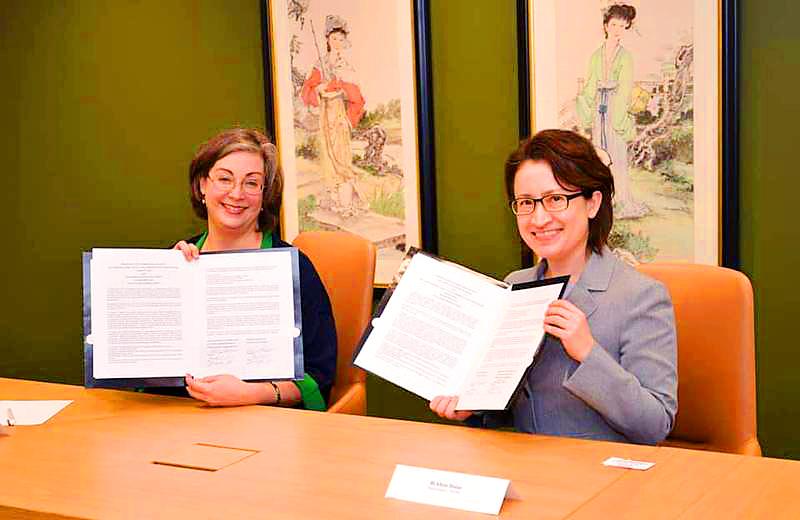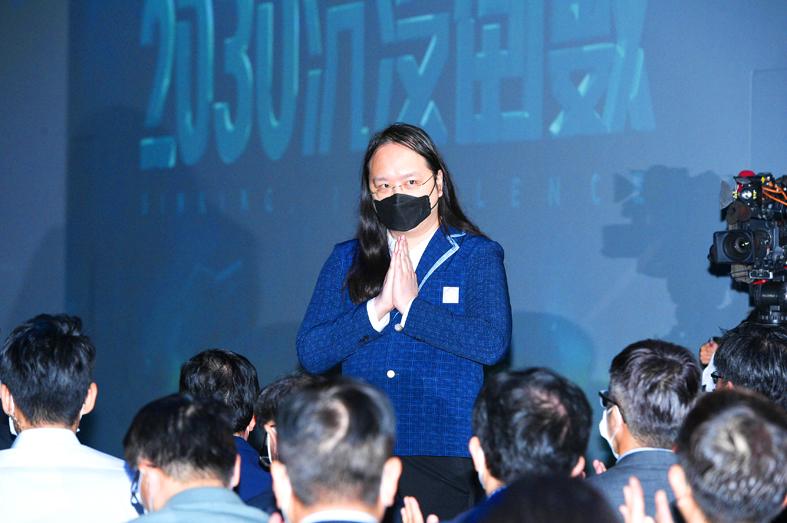Minister Without Portfolio Audrey Tang (唐鳳) and Representative to the US Hsiao Bi-khim (蕭美琴) are to attend the US-led Summit for Democracy on Dec. 9 and 10, the government said yesterday, after US President Joe Biden announced the list of guests for the virtual event.
The US Department of State on Tuesday announced a list of 110 invited participants, including Taiwan, Australia, Canada, the Czech Republic, France, Germany, Japan and the UK.
China and Russia were not invited, and Beijing expressed anger at the decision to invite Taiwan.

Photo: RITCHIE B. TONGO, EPA-EFE
The summit is to revolve around three key themes: Defending against authoritarianism, addressing and fighting corruption, and promoting respect for human rights, the department said in a statement in February, adding that the event would engage leaders from governments, civil society and the private sector.
Tang and Hsiao are to share how Taipei has improved government operations with technological and digital tools, and convey Taiwan’s commitment to defending democracy, Presidential Office spokesman Xavier Chang (張惇涵) said in a statement.
The firm partnership between Taipei and Washington is evidenced in their close interactions in areas ranging from the summit, the second US-Taiwan Economic Prosperity Partnership Dialogue on Tuesday and the third annual US-Taiwan Consultations on Democratic Governance in the Indo-Pacific Region on Monday last week, Chang said.

Photo: Lu Yi-hsuan, Taipei Times
At a US House of Representatives Committee on Foreign Affairs hearing in March, US Secretary of State Antony Blinken had promised that the US would invite Taiwan to the summit, the Ministry of Foreign Affairs said.
The US is still planning the summit’s agenda, while maintaining close communication with Taiwan in a bid to better reflect the nation’s democratic achievements, the ministry said.
To echo Washington’s goals for the summit, the government has taken concrete action, such as completing its first national human rights action plan last year, it said.

Photo: Chen Yi-kuan, Taipei Times
The government would also continue to promote democracy and human rights through the Global Cooperation and Training Framework, it said.
Taiwan is on the front line of defending freedom and democracy against authoritarianism, and would continue to work with civic groups at home and abroad, as well as like-minded countries, to be a force for good in the world, the ministry said.
Experts on China said that Washington inviting Taipei to attend the summit was significant.
“I agree Taiwan more than qualifies- but it does seem to be only democratic govt invited that the US govt does not officially recognize. So its inclusion is a big deal,” Hofstra University law professor Julian Ku (古舉倫) wrote on Twitter.
“For this kick-off summit ... there’s a case for getting a broad set of actors into the room: It provides for a better exchange of ideas than setting a perfect bar for qualification,” Open Society Foundations codirector Laleh Ispahani told reporters.
Rather than using the summit as an anti-China meeting, Ispahani urged Biden to address “the serious decline of democracy around the world — including relatively robust models like the US.”
There was an angry rebuke from Beijing, which said it “firmly opposes” the invitation of Taiwan to “the so-called Summit for Democracy.”
Additional reporting by AFP

SECURITY: As China is ‘reshaping’ Hong Kong’s population, Taiwan must raise the eligibility threshold for applications from Hong Kongers, Chiu Chui-cheng said When Hong Kong and Macau citizens apply for residency in Taiwan, it would be under a new category that includes a “national security observation period,” Mainland Affairs Council (MAC) Minister Chiu Chui-cheng (邱垂正) said yesterday. President William Lai (賴清德) on March 13 announced 17 strategies to counter China’s aggression toward Taiwan, including incorporating national security considerations into the review process for residency applications from Hong Kong and Macau citizens. The situation in Hong Kong is constantly changing, Chiu said to media yesterday on the sidelines of the Taipei Technology Run hosted by the Taipei Neihu Technology Park Development Association. With

CARROT AND STICK: While unrelenting in its military threats, China attracted nearly 40,000 Taiwanese to over 400 business events last year Nearly 40,000 Taiwanese last year joined industry events in China, such as conferences and trade fairs, supported by the Chinese government, a study showed yesterday, as Beijing ramps up a charm offensive toward Taipei alongside military pressure. China has long taken a carrot-and-stick approach to Taiwan, threatening it with the prospect of military action while reaching out to those it believes are amenable to Beijing’s point of view. Taiwanese security officials are wary of what they see as Beijing’s influence campaigns to sway public opinion after Taipei and Beijing gradually resumed travel links halted by the COVID-19 pandemic, but the scale of

A US Marine Corps regiment equipped with Naval Strike Missiles (NSM) is set to participate in the upcoming Balikatan 25 exercise in the Luzon Strait, marking the system’s first-ever deployment in the Philippines. US and Philippine officials have separately confirmed that the Navy Marine Expeditionary Ship Interdiction System (NMESIS) — the mobile launch platform for the Naval Strike Missile — would take part in the joint exercise. The missiles are being deployed to “a strategic first island chain chokepoint” in the waters between Taiwan proper and the Philippines, US-based Naval News reported. “The Luzon Strait and Bashi Channel represent a critical access

Pope Francis is be laid to rest on Saturday after lying in state for three days in St Peter’s Basilica, where the faithful are expected to flock to pay their respects to history’s first Latin American pontiff. The cardinals met yesterday in the Vatican’s synod hall to chart the next steps before a conclave begins to choose Francis’ successor, as condolences poured in from around the world. According to current norms, the conclave must begin between May 5 and 10. The cardinals set the funeral for Saturday at 10am in St Peter’s Square, to be celebrated by the dean of the College